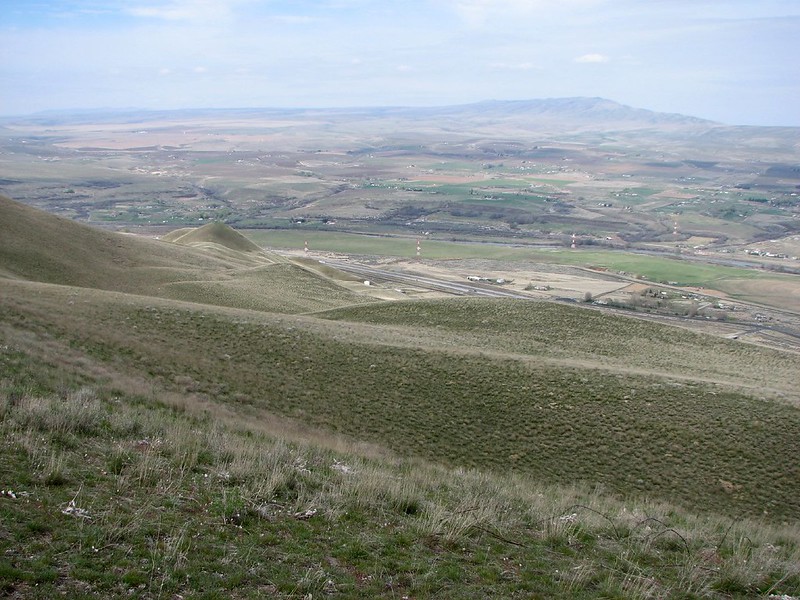
Washington State’s energy board cut the size of what would have been the state’s largest wind farm in half yesterday – here’s why.
Wind farm controversy in Washington State

The $1.7 billion, 1,150-megawatt (MW) Horse Heaven Clean Energy Center combines wind, solar, and battery storage. The original plan was for the project to feature 244 wind turbines across 24 miles of hills, and three solar farms over 5,447 acres south of the Tri-Cities, near the Oregon border.
But Horse Heaven has been stuck at the permitting stage with the seven-person Energy Facility Site Evaluation Council (EFSEC) for the last three years. Yesterday, the EFSEC voted 5-2 in favor of a rule stating that new wind turbines could not be located within two miles of the nests of endangered ferruginous hawks.
The ferruginous hawk is classified as a Priority Species whose habitats need protection, and its nests can be found throughout the planning area. The nests often sit empty, but North America’s largest hawk is known to return to its nests after years pass.
The Audubon Society – which states on its website that it “strongly supports wind energy that is sited and operated properly to avoid, minimize, and mitigate effectively for the impacts on birds, other wildlife, and the places they need now and in the future” – supports the EFSEC’s decision.
So that decision effectively cuts the number of Horse Heaven’s wind turbines in half. Understandably, Horse Heaven’s developer, Colorado-based Scout Clean Energy, isn’t happy. But the company can appeal the decision to the EFSEC. If that fails, then the case goes to Governor Jay Inslee (D-WA), who will make the final decision.
With 3.4 GW of capacity, wind power is the second-largest contributor to the state’s renewable electricity generation, behind hydroelectricity, which supplies 60% of Washington’s total electricity net generation. In 2023, wind provided almost 8% of the state’s power.
Washington State is No 3 in the US for renewable generation overall, behind California and Texas. But natural gas is the second-largest in-state source of net generation, fueling about 18% of Washington’s total electricity generation in 2023, according to the US Energy Information Administration (EIA).
By 2045, 100% of all electricity sold to Washington State customers must come from renewable or non-emitting sources.
Electrek’s Take
The EFSEC wanting the number of turbines reduced to protect an endangered hawk seems like a fair decision. The Audubon Society is very pro-wind power – they know that wind turbines aren’t the things that kill the most birds. No 1 is cats, No 2 is windows, and ultimately it’s climate change. So its support of the Horse Heaven decision carries weight.
The Yakama Nation isn’t in favor of the wind farm, either, citing damage to the hills’ cultural and historical significance. So it will be interesting to see what Inslee ultimately decides.
Top comment by BF
Washington is already well on their way. Less than 20% coal and natural gas and their last coal plant is scheduled to close in 2025. The main loss is the extra renewable energy in the western interconnection (that is, the energy being imported into, say, California being more from Wyoming coal than Washington wind). But in terms of Washington going emissions free - hydro, nuclear and wind make up a vast majority of their power already. The last 15% or so won’t be hard to make up
Washington is legally committed to achieving net zero by 2045, so they’ll ultimately have to figure it out.
Read more: Washington passes bill to target all EV sales by 2030 – for real this time
To limit power outages and make your home more resilient, consider going solar with a battery storage system. In order to find a trusted, reliable solar installer near you that offers competitive pricing, check out EnergySage, a free service that makes it easy for you to go solar. They have hundreds of pre-vetted solar installers competing for your business, ensuring you get high quality solutions and save 20-30% compared to going it alone. Plus, it’s free to use and you won’t get sales calls until you select an installer and you share your phone number with them.
Your personalized solar quotes are easy to compare online and you’ll get access to unbiased Energy Advisers to help you every step of the way. Get started here. – ad*
FTC: We use income earning auto affiliate links. More.






Comments